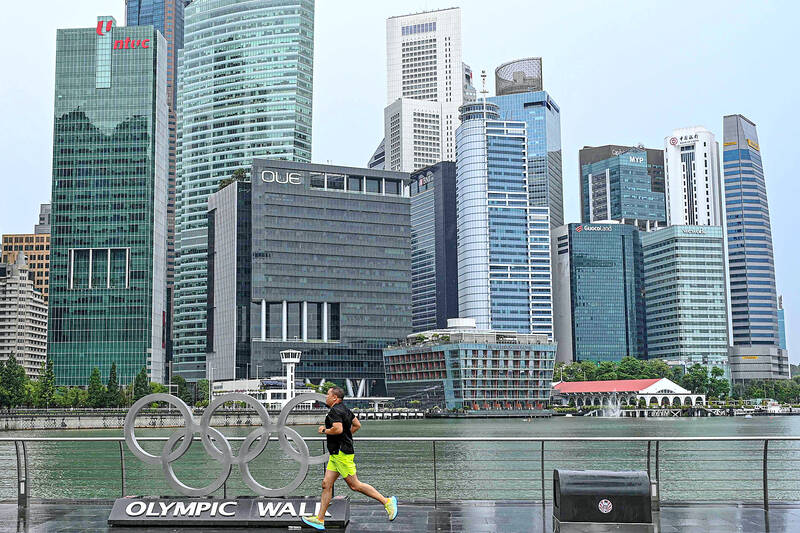Singapore’s economy grew more than expected in the third quarter, as a rush for all things linked to artificial intelligence (AI) drove up demand for computer chips, preliminary data released yesterday showed.
A healthy rebound in the key manufacturing sector powered the 4.1 percent year-on-year growth in the July-to-September period, the Singaporean Ministry of Trade and Industry said.
Economists had projected growth of less than 4 percent.

Photo: Roslan Rahman, AFP
Manufacturing, which includes computer chips, expanded 7.5 percent year-on-year, bouncing back from a 1.1 percent decline in the previous three months.
The government in August upgraded its economic growth forecast for this year from 1 to 3 percent to 2 to 3 percent.
Meanwhile, the Monetary Authority of Singapore said it would “maintain the prevailing rate of appreciation” of the Singaporean dollar, as the risks to inflation are “more balanced compared to three months ago.”
Singapore uses the exchange rate — the Singaporean dollar is pegged to a basket of currencies of its key trading partners — to deal with inflation, as it imports most of its needs.
“For the rest of 2024, Singapore’s growth should be sustained by the ongoing upswing in the electronics and trade cycles, as well as the easing in global financial conditions,” the central bank said.
Separately, Singapore yesterday moved to stop a S$2.2 billion (US$1.68 billion) deal that would have allowed German insurance giant Allianz SE to buy a majority stake in a local insurer.
Allianz in July announced a “pre-conditional voluntary cash general offer” to buy at least 51 percent of Singapore’s Income Insurance Ltd at S$40.58 per share as it seeks to strengthen its presence in Singapore and Asia.
Income Insurance had said it needed Allianz’s financial muscle to compete better in the industry.
The deal raised fears among some locals that being majority owned by a private company would dilute Income Insurance’s social mission of providing affordable insurance.
A former cooperative that became a non-listed company in 2022, Income Insurance’s largest shareholder is NTUC Enterprise Co-operative Ltd, a holding entity for the various social enterprises under the labor movement.
“The government has assessed the proposed transaction and has decided that it would not be in the public’s interest for the transaction, in its current form, to proceed,” Singaporean Minister of Culture, Community and Youth Edwin Tong (唐振輝) told parliament.
The ministry “is not satisfied that Income will be able to continue fulfilling its social mission after the proposed transaction,” he added.
A bill was tabled in parliament yesterday to allow the central bank to “withhold approval of the sale on grounds of public interest when it involves a current or former cooperative insurer,” Singaporean Prime Minister Lawrence Wong (黃循財) said on Facebook.

MULTIFACETED: A task force has analyzed possible scenarios and created responses to assist domestic industries in dealing with US tariffs, the economics minister said The Executive Yuan is tomorrow to announce countermeasures to US President Donald Trump’s planned reciprocal tariffs, although the details of the plan would not be made public until Monday next week, Minister of Economic Affairs J.W. Kuo (郭智輝) said yesterday. The Cabinet established an economic and trade task force in November last year to deal with US trade and tariff related issues, Kuo told reporters outside the legislature in Taipei. The task force has been analyzing and evaluating all kinds of scenarios to identify suitable responses and determine how best to assist domestic industries in managing the effects of Trump’s tariffs, he

TIGHT-LIPPED: UMC said it had no merger plans at the moment, after Nikkei Asia reported that the firm and GlobalFoundries were considering restarting merger talks United Microelectronics Corp (UMC, 聯電), the world’s No. 4 contract chipmaker, yesterday launched a new US$5 billion 12-inch chip factory in Singapore as part of its latest effort to diversify its manufacturing footprint amid growing geopolitical risks. The new factory, adjacent to UMC’s existing Singapore fab in the Pasir Res Wafer Fab Park, is scheduled to enter volume production next year, utilizing mature 22-nanometer and 28-nanometer process technologies, UMC said in a statement. The company plans to invest US$5 billion during the first phase of the new fab, which would have an installed capacity of 30,000 12-inch wafers per month, it said. The

Taiwan’s official purchasing managers’ index (PMI) last month rose 0.2 percentage points to 54.2, in a second consecutive month of expansion, thanks to front-loading demand intended to avoid potential US tariff hikes, the Chung-Hua Institution for Economic Research (CIER, 中華經濟研究院) said yesterday. While short-term demand appeared robust, uncertainties rose due to US President Donald Trump’s unpredictable trade policy, CIER president Lien Hsien-ming (連賢明) told a news conference in Taipei. Taiwan’s economy this year would be characterized by high-level fluctuations and the volatility would be wilder than most expect, Lien said Demand for electronics, particularly semiconductors, continues to benefit from US technology giants’ effort

‘SWASTICAR’: Tesla CEO Elon Musk’s close association with Donald Trump has prompted opponents to brand him a ‘Nazi’ and resulted in a dramatic drop in sales Demonstrators descended on Tesla Inc dealerships across the US, and in Europe and Canada on Saturday to protest company chief Elon Musk, who has amassed extraordinary power as a top adviser to US President Donald Trump. Waving signs with messages such as “Musk is stealing our money” and “Reclaim our country,” the protests largely took place peacefully following fiery episodes of vandalism on Tesla vehicles, dealerships and other facilities in recent weeks that US officials have denounced as terrorism. Hundreds rallied on Saturday outside the Tesla dealership in Manhattan. Some blasted Musk, the world’s richest man, while others demanded the shuttering of his